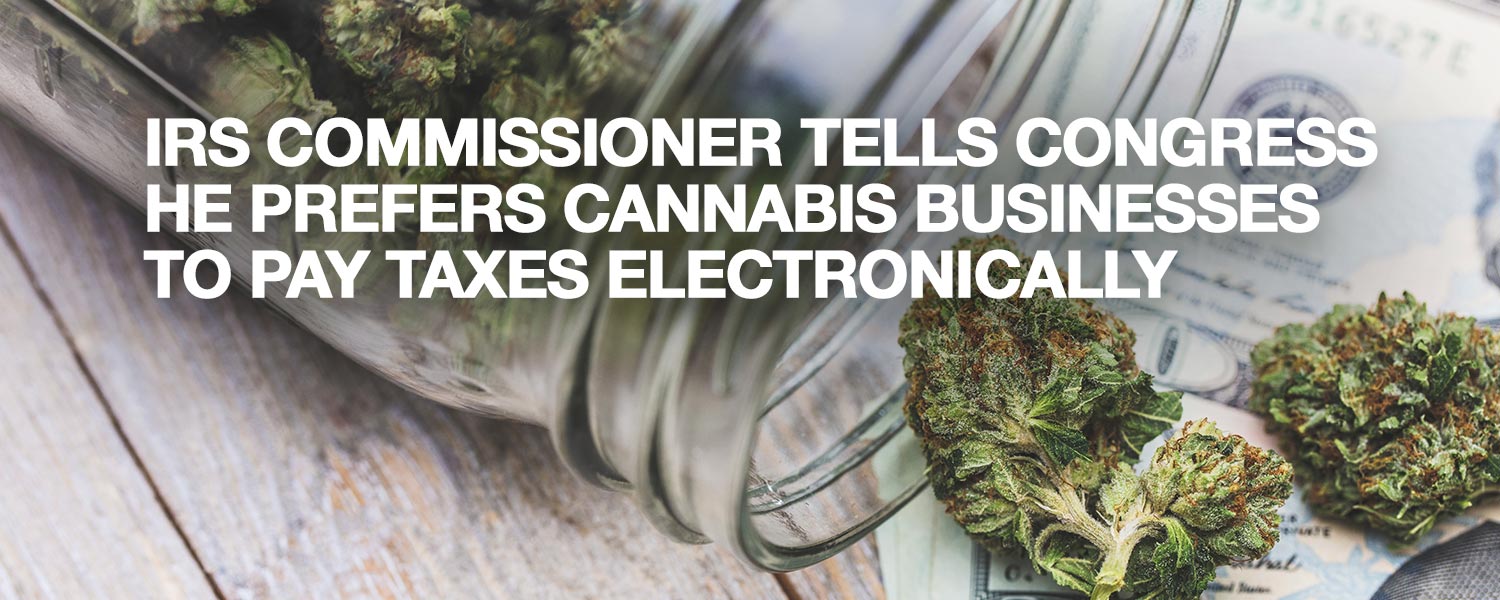IRS Commissioner Tells Congress That He Prefers Cannabis Businesses Be Able To Pay Taxes Electronically
In a hearing before the House Appropriations Financial Services and General Government Subcommittee on February 23, 2021, IRS Commissioner Charles Rettig told Congress that the federal agency would “prefer” for state-legal marijuana businesses to be able to pay taxes electronically, as the current largely cash-based system under federal cannabis prohibition is onerous and presents risks to workers.
Rep. David Joyce (R-OH), who serves as a co-chair of the Congressional Cannabis Caucus, said that barring marijuana companies from traditional financial services is “inefficient for business and the IRS alike, obviously, not to mention ample opportunity for fraud and abuse it creates, as well as potential for criminal acts as far as robbing and stealing from those.”
Getting Harder For Legal Cannabis To Find Banking
Even though more and more states are allowing the sale of cannabis at the medical and/or recreational level, it is still a business that deals essentially in cash only. Why? Because most traditional banks refuse to deal with any cannabis businesses. This forces cannabis businesses to seek alternative financial institutions, smaller banks and credit unions that are willing to work with cannabis businesses so that these businesses can pay their expenses and even taxes in a manner more safe and secure than delivering stacks of $20 bills.
Nevertheless, cannabis companies still operate in a legal grey area because cannabis remains illegal under Federal law. Federal law classifies cannabis as a Schedule 1 drug, meaning it has “currently no accepted medical use”. Treating cannabis, no differently than heroin, the Federal government has entrusted the Treasury Department with the authority and responsibility to monitor bank activity to make sure that activities which are illegal under Federal law are not utilizing the banking channels and functions that are normally available.
Financial Crimes Enforcement Network (“FinCEN”)
FinCEN is a bureau of the U.S. Department of the Treasury. The Director of FinCEN is appointed by the Secretary of the Treasury and reports to the Treasury Under-Secretary for Terrorism and Financial Intelligence. FinCEN’s mission is to safeguard the financial system from illicit use and combat money laundering and promote national security through the collection, analysis, and dissemination of financial intelligence and strategic use of financial authorities.
FinCEN carries out its mission by receiving and maintaining financial transactions data; analyzing and disseminating that data for law enforcement purposes; and building global cooperation with counterpart organizations in other countries and with international bodies.
FinCEN exercises regulatory functions primarily under the Currency and Financial Transactions Reporting Act of 1970, as amended by Title III of the USA PATRIOT Act of 2001. Under this authority the Secretary of the Treasury is to issue regulations requiring banks and other financial institutions to take a number of precautions against financial crime, including the establishment of AML programs and the filing of reports that have been determined to have a high degree of usefulness in criminal, tax, and regulatory investigations and proceedings, and certain intelligence and counter-terrorism matters. This authority has been delegated to FinCEN.
The basic concept underlying FinCEN’s core activities is “follow the money.” As FinCEN believes that the primary motive of criminals is financial gain, and they leave financial trails as they try to launder the proceeds of crimes or attempt to spend their ill-gotten profits. FinCEN shares the information it receives and analyzes with other law enforcement agencies to investigate and hold accountable a broad range of criminals, including perpetrators of fraud, tax evaders, and narcotics traffickers. More recently, the techniques used to follow money trails also have been applied to investigating and disrupting terrorist groups, which often depend on financial and other support networks.
Reporting Of Cash Payments
The Bank Secrecy Act (“BSA”) enacted in 1970 requires financial institutions in the United States to assist U.S. government agencies to detect and prevent money laundering. Specifically, the act requires financial institutions to keep records of cash purchases of negotiable instruments, and file reports of cash purchases of these negotiable instruments of more than $10,000 (daily aggregate amount), and to report suspicious activity that might signify money laundering, tax evasion, or other criminal activities. The BSA requires any business receiving one or more related cash payments totaling more than $10,000 to file IRS Form 8300, Report of Cash Payments Over $10,000 Received in a Trade or Business.
The minimum penalty for failing to file EACH Form 8300 is $25,000 if the failure is due to an intentional or willful disregard of the cash reporting requirements. Penalties may also be imposed for causing, or attempting to cause, a trade or business to fail to file a required report; for causing, or attempting to cause, a trade or business to file a required report containing a material omission or misstatement of fact; or for structuring, or attempting to structure, transactions to avoid the reporting requirements. These violations may also be subject to criminal prosecution which, upon conviction, may result in imprisonment of up to 5 years or fines of up to $250,000 for individuals and $500,000 for corporations or both.
Cannabis-related businesses operate in an environment of cash transactions as many banks remain reluctant to do business with many in the marijuana industry. Like any cash-based business the IRS scrutinizes the amount of gross receipts to report and it is harder to prove to the IRS expenses paid in cash. So it is of most importance that the proper facilities and procedures be set up to maintain an adequate system of books and records.
Why Banks Are Reluctant To Deal With Cannabis Businesses
Under the Obama administration, then-Deputy Attorney General James Cole issued a memo, known as the Cole Memorandum that clarified the Justice Department’s stance on cannabis. The memo, from August 29, 2013, asserted that, for the most part, the Justice Department would not enforce the cannabis ban in states that had legalized it. Following that spirit, on February 14, 2014 the Treasury Department issued its own guidance through FinCEN on how banks could provide services to the cannabis industry without violating Federal Law. As long as banks complied with this guidance, they could avoid the threat of federal prosecution and make themselves available to provide banking and financial services to cannabis businesses.
But under the Trump administration, the Justice Department led by former Attorney General Jeff Sessions rescinded the Cole memo, calling marijuana “a dangerous drug” and asserting that “marijuana activity is a serious crime”. The Treasury Department led by Treasury Secretary Steve Mnuchin has yet to revoke the FinCEN guidance which although that guidance referenced the Cole memo multiple times, the guidance still remains a part of the framework by which banks and other financial institutions can make themselves available to do business with the cannabis industry.
Now That We Are In The Biden Administration, Where Does Cannabis Banking Go?
During a confirmation hearing on February 23, 2021 for President Joe Biden’s pick for deputy secretary of the Treasury, Sen. Catherine Cortez Masto (D-NV) asked the nominee, Adewale Adeyemo, whether he feels 2014 FinCEN guidance should be updated to “set expectations for financial institutions that provide services to cannabis-related industries” and what steps he would take to that end.
Mr. Adeyemo replied: “I look forward, if confirmed, to talking to my colleagues at Treasury about this important issue and thinking through what changes may be needed and doing this in a way that’s consistent with the interagency with the president’s guidance.”
Today’s Banking Challenge
Despite more states legalizing cannabis, a tiny fraction of banks and alternative financial institutions are willing to work with cannabis companies. As of September 30, 2020 FinCEN issued a report stating that there were 677 banks and credit unions that filed reports saying they were working with cannabis clients. Unfortunately this number is down from 695 in the last fiscal quarter ending in June and 711 for the quarter preceding that.
What Should You Do?
It is best to be proactive and engage an experienced board certified tax attorney-CPA in your area who is highly skilled in the different legal, banking and tax issues that cannabis businesses face. Let the cannabis tax attorneys of the Law Offices of Jeffrey B. Kahn, P.C. located in Orange County (Irvine), Los Angeles and other California locations protect you and maximize your net profits. Also, if you are involved in crypto currency, check out what a bitcoin tax attorney can do for you.








